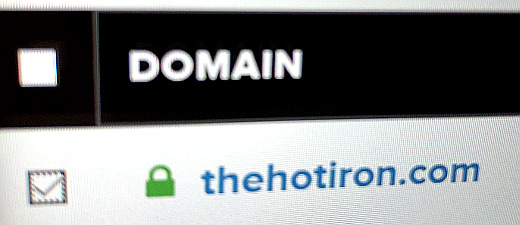Thank you for this heads up. I just updated my physical address on all my domains. I left that field linger, so I wouldn’t get junk mail. But now I see the value in updating it.
Update Your Domain Name Contact Information

Where I’d like this simply to be friendly advice, I present it as a warning – update the contact and payment information for your domain names as soon as possible or you could risk losing your Web site and email.
Keep It All Current
It’s a challenge to manage all of the online accounts we have, both personally and for business as well. Often an account can “linger” out there without any problem, such as a frequent flyer account, if you don’t have your most current mailing address on file with the airline. However, a domain name registrar account doesn’t fall under this category. Why? You never know when you will need to make a change to or renew your domain names, and if you need to do so right away, you may be prevented from doing so.
Even if you have private registration on your domain name account, your contact information needs to be current. For those not familiar, private registration is when someone looks up the registration of your domain name, instead of seeing your actual name, address and phone numbers, they will see masked information. This is to prevent someone from scraping your contact info for the means of soliciting you, or worse – scamming you.
Keeping it all current means your domain name registration remains active and accessible. This includes your name, address and phone numbers, as well as the billing credit card for renewing your domain name.
Untimely Lockout
If your information isn’t correct, you may lose access to your domain name account and would need to have it reestablished, or worse, your domain name can expire and you can’t renew it in a timely manner.
How does this happen? Many domain name registrars are activating two-factor authentication, or 2FA, without explicit notification to or opt-in by its customers. 2FA is when you get prompted to enter a code that was sent to you by email or text message, or an app like Google Authenticator which generates a code. I have personally experienced this from several registrars, and if the phone number or email on file is no longer accurate, then you can get locked out of your account. Where the registrars say they are doing this to protect their customers, when a Web site and email is down, more damage is done.
If the information is accurate and correct, you won’t run the risk of losing access to your account. If this does happen, you may have to “prove” who you are offline, including sending in a copy of a driver’s license or other forms of ID, or even articles of incorporation for a business.
Remind Yourself Online and Offline
Most domain name registrars will send you reminder emails or texts when it’s close to your domain name expiration date. That is, if they have your correct email address and phone number, and you have enabled these notifications.
A simple way to remind yourself to check your domain account information is to put an alert in your calendar. I recommend setting one sixty days before the domain name is set to expire. That way if the information is not current, you have some time to take care of any process your registrar imposes, and can still renew it before it expires. Setting alerts every 3 months is not a bad idea either, especially if your credit card changes or your home or business address changes, especially in an increased work-from-home environment.
Additionally, information on your domain name should be in your “vital records” file. In the event there is a change in management or leadership in your form or organization, the first thing the successor may not be thinking about is the domain name. That is, unless it expires and the Web site disappears and email stops working. A simple 1-page sheet, sealed in an envelope and clearly marked, listing all domain names and their expiration date, the registrar Web site and contact info and the login and password should be sufficient.
Pro Tip on Extending Your Registrations
Domain names are often renewed annually, however you have the option to extend their registration up to ten years in advance. I recommend this for the primary domain name for your Web site and email, and any other domain names tied to key sites and services. Where it is not completely a “set it and forget it” scenario, you do gain some peace of mind in not having to renew it annually.
Deconstructing Domain Name Registrations
Everyday your Web sites and email become increasing vital to yourself and your firm or organization. Maintaining their domain names is equally as vital to ensure those services are accessible. This maintenance is not laborious or even time consuming; it simply has to be done. Reminding yourself and others key people will ensure there is awareness and coverage for this important task.
This is from The Hot Iron, a journal on business and technology by Mike Maddaloni.
Did you enjoy this? Subscribe to The Hot Iron by RSS/XML feed or Read by Email
Business • Domain Names • Technology • (2) Comments • PermalinkComments
@Matt - Glad it convinced you! You can always get private registration, though you may have to pay extra for it.
mp/m
Post a Comment
Note: Comment moderation is active, and your comment will be viewable once it is reviewed.

